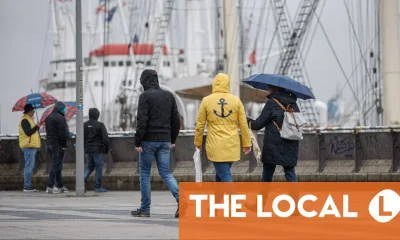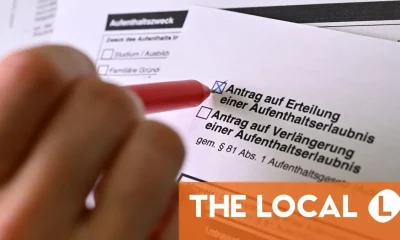We’re living in strange times.
So strange, in fact, that the parties in Germany’s fractured political landscape have actually delivered a landmark agreement junking our hallowed’ debt brake’ three days earlier than everyone assumed.
After the previous coalition gratuitously self-ignited on the very day Trump was re-elected last autumn and Friedrich Merz ill-advisedly had his CDU/CSU MPs vote with the far-right in January, expectations of our political parties’ ability to reach compromises in the national interest have been understandably low. Rapid cross-party agreement? Pigs might fly!
So you could be forgiven for having expected the current set of negotiations between CDU/CSU and the SPD on one side and the Greens on the other to, at the very least, to go right down to the wire.
READ MORE: Parties strike deal for historic spending boost
The wire, in this sense, is next Tuesday – the last possible day on which the 2021 Bundestag can pass legislation before it cedes to the new parliament elected last month.
Here, hard-left Die Linke and the far-right AfD will have enough seats to block changes to the constitution, hence the sense of urgency in recent days.
Why are we changing the constitution again?
Because Germany’s tight fiscal rules – die Schuldenbremse, the debt brake – were written into it back in 2008. So anyone looking to change them needs a parliamentary supermajority of the kind the centre parties are unlikely to ever have again.
Advertisement
PIGS: What is – or was – the debt brake?
If you remember the late 2000s, you’ll know that debt was a dirty word. In the wake of the financial crisis, many northern European countries worried that they would get mistaken for over-indebted “PIGS”: Portugal, Italy, Greece, Spain.
So they sought to reassure international markets that they were reliable creditors: Britain, for example, went in big for austerity and adopted fiscal rules overseen by a flashy new Office of Budget Responsibility.
Germany, meanwhile, opted for a typically inflexible solution by writing into the constitution that no government may take on more than 0.35 percent of GDP in new debt.
The rationale was that politicians are always looking to spend more – and that debt is always a more tempting way to do this than cutting services or raising taxes.
In this sense, the debt brake was like Odysseus tying himself to the mast to stop himself from falling for the siren calls.
EXPLAINED: Germany’s new debt deal and what it means for residents
Advertisement
Hams: Why are we changing/dumping it?
Odysseus has been struggling against his bonds for some time now, however. Most countries which adopted tight fiscal rules in the 2000s and 2010s have since tried to loosen them again – especially since the pandemic and the Ukraine war tanked economies and slashed tax receipts, leaving the state needing to invest fast and debt as the only way to do it.
Thus far, Germany has been quite clever about this, using creative accounting to avoid spooking markets. It started back in 2020 when then finance minister Olaf Scholz famously ‘got out the bazooka’ to offer struggling firms unlimited credit.
Then, as Chancellor, Scholz continued his linguistically and fiscally unorthodox approach, sticking 100 billion euros for rearming the Bundeswehr on a new tab deceptively labelled ‘extra assets’ (Sondervermögen) before going all-out with the Doppelwumms (‘double bam’), a 200-billion euro splurge to balance out the effects of high energy prices.
And so the famed debt brake has already been controverted by various cheats, special funds, and one-off exceptions in recent years. In that way, it’s like the Simpsons with their hams: “Marge, prepare the emergency ham!” shouts Homer in SE14 E19; later, he demands the “celebration ham”, only to be told: “All we have are the earthquake ham and the condolence ham.” His exasperated reply reveals his real attitude: “Marge, they’re just hams, okay?”
Thus far, Germany has been labelling its hams: arguments about what to call them – and whether to buy any more – were what sunk the last government.
Now, with US security guarantees more or less withdrawn, a severe worldwide recession on the way due to Trump’s errant economics, and the Federal Republic’s firms headed to the wall, Berlin politicians have realised that investors actually aren’t that fussed about whether Germany calls its hocks Sondervermögen or just plain Schulden.
Advertisement
Of Truss and Trump: What effects will this have?
Debt is no longer a dirty word – and the incoming government desperately needs money to avoid raising taxes or cutting spending on things like pensions, neither of which is viable in the current political and economic climate.
So, no one is doing things by halves anymore: the new Sondervermögen is now an outsized 500 billion euros, and the Schuldenbremse will be modified to exempt all military spending above 1 percent of GDP. The Greens have agreed to this – with some caveats – because they, too, believe this is the only way to rearm Germany and rebuild its infrastructure.
All of this leaves the debt brake nominally in place but factually defunct.
Yet for the typical German the effects of this will be broadly positive. Everyone knows that Germany has spent decades scrimping on public spending while letting its public realm go to wrack and ruin.
The fact that 500 billion euros is now being made available over the next four years gives public bodies and the companies supplying them the confidence to invest.
The same is true of the defence industry, which now knows that the new government will be able to take on unlimited debt to buy tanks. Provided that government agencies don’t fritter away the money on new layers of bureaucracy, all of this will shore up flagging demand, secure jobs, and keep the economy running.
Yes, Germany’s sovereign debt will now surge – from 63 percent currently to 80 percent, perhaps even 90 percent in the foreseeable future: that all depends on how much growth the package generates and on all sorts of other factors.
It’s not really a problem, though: the US is already at 125 percent, and every other G7 economy is now over 100 percent debt to GDP. Germany is not about to become the next Greece (and, in fact, the PIGS are all doing rather well now).
Nevertheless, there will be some side effects. Most immediately, mortgage rates are shooting up back towards 4 percent this week as credit costs rise. This isn’t Liz-Truss or Donald-Trump-level chaos, and far fewer Germans even have mortgages, with those that do generally financed for 10 or even 15 years.
Anyone wanting to buy a flat or a house right now, however, will see their finances stretched. As will we all over the next decade: this level of state demand will doubtless keep inflation running at well above 2 percent.
READ ALSO: Germany’s Merz urges MPs to back spending bonanza in fiery debate
Advertisement
Political hazard: What could go wrong?
The real danger here is not economic but political. Germany will now, next week, use an outgoing parliament to push through an amendment to its constitution, which will totally change how the state runs its finances for at least a decade.
Hardly anyone casting their ballot in 2021 voted for this: back then, even the Greens were all about the Schuldenbremse. And those who voted for Friedrich Merz to lead the next government last month didn’t vote for him to junk the debt brake, either: he banged on about its importance at every opportunity.
As such, there is a real issue of legitimacy here – and you can expect the AfD, which started as an anti-Euro, anti-PIGS party of fiscal probity, to make political capital of this for years to come.
The far-right party will now be able to claim that a cabal of spendthrift centrist types have ruined Germany’s public finances without so much as a by-your-leave; a not insignificant number of voters will share this feeling.
Nevertheless, on balance, this is a good day for Germany. Whether it was honest with voters about it before or not, the CDU/CSU have now finally accepted that we need to invest far more than the debt brake allows in its present form; the SPD were open about wanting it changed in this campaign – as were the Greens.
Advertisement
And despite the fact that CDU/CSU spent months characterising them unfairly as loony-left types who are supposedly a danger to the country, the Greens once again showed that their sense of responsibility is stronger than their wounded pride.
For now, at least, cross-party agreement for the greater good is back on the agenda. Pigs are flying.





































